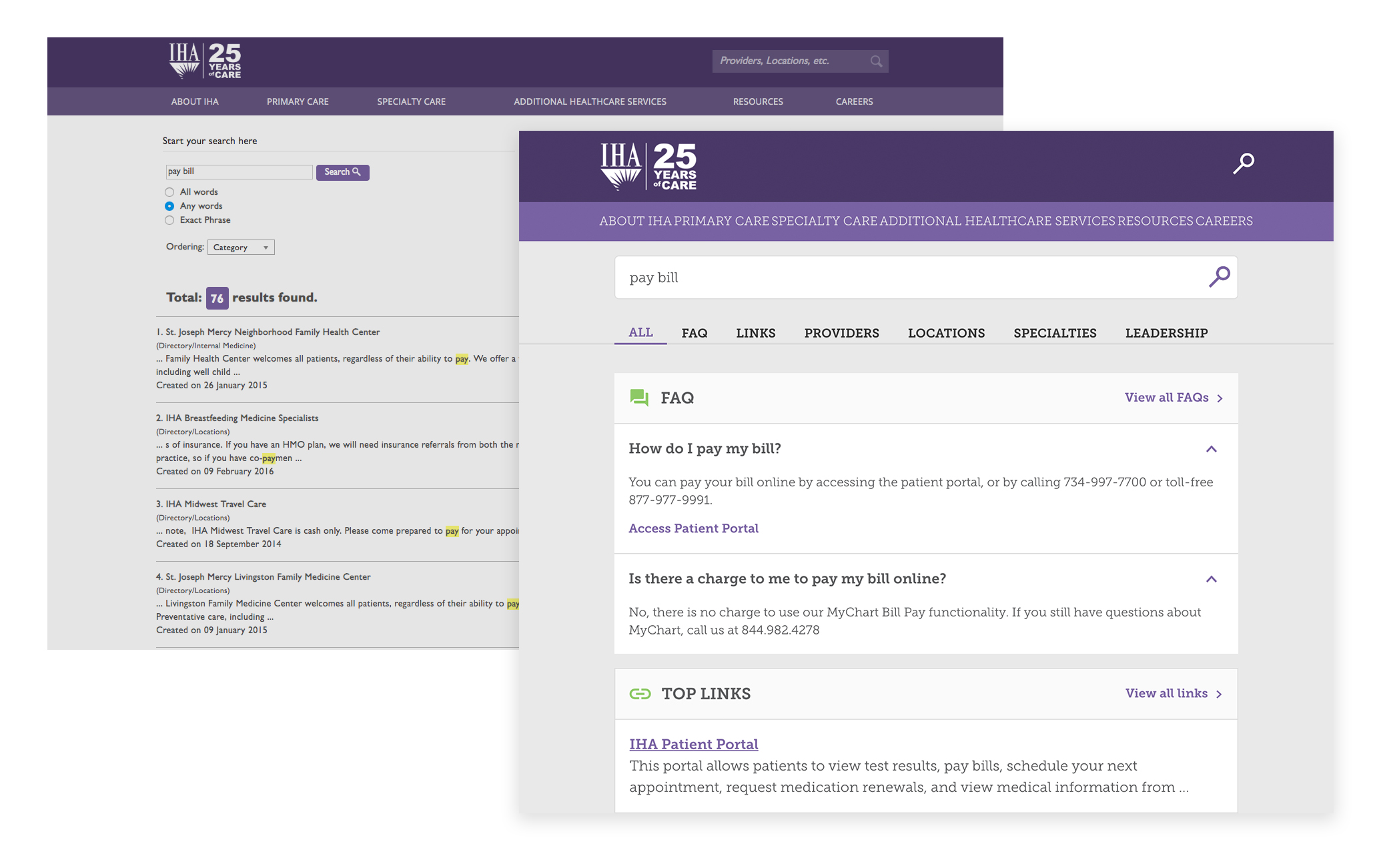Industry Insights
How Healthcare Organizations Can Improve the Patient Experience Through Direct Answers
Discover how your healthcare organization can improve patient access, deliver answers on your website, and drive more online appointment bookings.

Healthcare industry experts shared at HCIC 2019 that an estimated 84% of patients perform a search after receiving a diagnosis — and modern AI services like Google and Alexa have trained them to expect immediate answers to their healthcare questions. But chances are your marketing tech stack isn't prepared to deliver them, leading to a poor patient experience and deficits in patient access.
Carrie Liken, Yext's Head of Industry, Healthcare, recently joined Meghan Brescia, Brand Strategy Manager at IHA for a chat about how to address these challenges in order to improve patient access, deliver answers on your website, and drive more online appointment bookings. Read on for three key takeaways from the webinar.
1.1 billion healthcare questions are asked every day on Google.
Google has trained us to search differently over the last 20 years. Patients now ask more questions than ever and search in far more complex ways — and they expect better and better answers.
They also don't discriminate. Patients don't search one way on Google, and then search in a more simple way on a health system's website or app. They search the same way everywhere. And more than 80% of the time, patients are seeking information about you by using multi-dimensional search queries.* Here's an example: "Best primary care provider near me accepting patients who is rated 4 stars."
Delivering an answer to this question requires diverse information — from geography-based data, to rating designation and custom attributes. But too many healthcare organizations aren't up to this task.
2. More patients are asking questions on health system websites, but 90% of healthcare organizations can't answer them.
From 2018 to 2019, Yext research saw a 30% year-over-year increase in patients consulting a health system's website before making a health decision.** Of those 1 billion healthcare searches happening each day on Google, people are landing back onto owned properties more often. But 90% of healthcare organizations couldn't answer the kinds of multi-dimensional, natural language questions patients are asking*** — meaning that patients can't find the information they came for, and they can't match up with the right provider.
We know that patients search externally for healthcare. But a patient searching directly on your site is highly qualified. They are either current patients looking to take an important action — like pay a bill — or they're valuable prospective new patients who want information about your organization specifically. If you don't answer their question on your site, these patients will bounce off your site back to Google. Why let Google be your homepage when you can control the patient experience right on your own website?
Health systems that can't answer questions have failed the patient and delivered poor access to care. How can we change this?
3. IHA became "answers-ready" — and drove a 400% increase in online appointment conversions.
IHA is one of the largest multi-specialty groups in Michigan, delivering more than one million patient visits each year. The organization employs more than 2,200 staff, including more than 750 providers — a group made up of physicians, nurse practitioners, physician assistants, and midwives — in approximately 90 practice locations across Southeast Michigan.
"As our organization rapidly expanded over the past few years, we outgrew the homegrown provider directory on our CMS tool. Our site search, also homegrown, was comprised of blue links only with no opportunities for conversion, often sending visitors down a rabbit hole to find what they were looking for," Brescia explained. "Relationship mapping is also a big pain point for our existing patients. They may already have an appointment with a provider and go online to find directions to the practice. If we're only displaying one location, they could drive to the wrong practice and miss their appointment, causing frustration on both ends."
IHA knew they could deliver a better patient experience. That's where Yext came into the picture with Yext Answers.
Natural language processing technology is the foundation of Yext Answers, giving you the ability to understand the long detailed questions your patients ask — "GP near me who takes Cigna," for one example — and surface direct, relevant answers about your health professionals (and more). Yext also enables healthcare organizations to put calls-to-action in those answers, helping to drive more conversions — and turning search into a transaction engine for your business.
Leveraging Yext Answers and Yext's Doctor Finder tool has empowered IHA to collect intent data, analyze trends, and deliver answers. "Yext Answers has given us much more intel to our queries than we had in the past. We identified query trends and prioritized creating some topical FAQs with conversion opportunities to populate the answers tool," Brescia said. "For example, we saw multiple combinations of searches for 'bill pay' or 'how do I pay my bill online,' so we created a simple FAQ with our Client Services phone number, and a hyperlink to online bill pay in our Patient Portal."
Here's an example of IHA's search experience for the query "Pay bill" before and after working with Yext.

Now, IHA has created a better patient experience that drives more clicks and dramatically increases appointment bookings. Since launch, IHA has seen a 400% increase in online appointment conversions — proving that delivering answers pays off.
Learn more about IHA's partnership with Yext by watching the full webinar.
* Yext internal study of healthcare customers, 2019
**Yext Patient Search Journey study, 2019
***Yext review of top 100 healthcare websites
